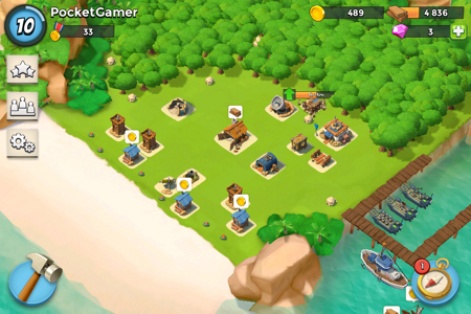Has mobile gaming left independent developers behind?
There's certainly a fear that it has - developers on mobile have a wariness of the platform. It's a difficult one on which to succeed, that's for sure.
Yet I think this question is based on misconceptions about the mobile market; based on what it is now compared to what it once was, and what the independent mobile developer scene is compared to that for PC and consoles.
Back in time
Mobile gaming certainly has changed. It was very friendly to independent developers back in 2009 and 2010 - the early days of the Apple App Store.
The openness of the App Store compared to the previous mobile market served as an important opening for developers willing to take the risk. And it felt like plenty of developers found some level of prosperity.
But many factors changed. One was the race to the bottom of the App Store pricing structure, which was all about driving a large volumes of sales, and which eventually collapsed into the current free-to-play business.

Also, as more developers succeeded on mobile, larger companies started to take it seriously - and their resources for things like user acquisition make it possible to make more money in the free-to-play economy.
It's not that smaller developers can't succeed in free-to-play, but it's certainly not the even playing field it once was.
Pull me, push you
Equally significantly, platforms outside of the App Store started to open up. Sony and Microsoft became much more accessible, while Steam is easy to sell on. And on mobile, Google Play has also become a viable option, even if it's one on which people are even more loath to pay for content than on iOS.
Yet, platforms-aside, perhaps the key issue for indie developers is that they overwhelming favor selling their games for an upfront cost.
From a 'traditional gaming values' perspective, free-to-play is seen as impure.
Part of this is because there are prominent voices in the scene who are well-versed in terms of arguing about game criticism and game design from the context of what we could call 'traditional gaming values'. From this perspective, informed by what gaming once was, free-to-play is seen as impure
In this regard, then, I think indie mobile developers are caught in a conundrum.
Whereas the charts once represented them (and still do in some extent with the paid charts), the top grossing charts are practically impossible to crack.
Meanwhile, the most prominent creative voices advocate against business strategies which they say devalue content. Anyways, making a game that looks or plays like one of those from Supercell or King isn't the difficult part. Their competitive advantage comes from their analytics and user acquisition; skills that indies don't have the resources to hone.
Light in the tunnel
But it's not all bad news.
Indies can find ways to succeed. In particular, smaller games are often featured by Apple and still do well, and indies have the flexibility to make these games. We see games like Crossy Road, which was developed by three-person Australian outfit Hipster Whale, get over 2.5 million downloads.
Similarly, small indies like NimbleBit and Retro Dreamer have capitalized on simple games with strong art styles, while slightly larger outfits such as eight-man Noodlecake Games demonstrates you can upscale from development to porting and publishing.
What we need is some of the creatively and commercially successful indies to preach about how to do well in the space.
I'd love for people like the NimbleBit's Marsh brothers, or Imangi's Natalia Luckyanova and Keith Shepherd to go on the convention circuit, giving talks about how they have continued to operate in the mobile space in the time of free-to-play, given that they have respected games and all aren't afraid to use modern mobile monetization.
Success through compromise
I think indie developers trying to succeed on mobile need to do one of two things.
One is that if they're going to focus on mobile, they need to ignore everyone working in the PC and console space. That is such a different space that the only real similarity is that they're making interactive entertainment. The needs of the mobile player are different from the console/PC player, and you have to design for them and what you can make.
Indies have the strength to be flexible, releasing many small projects, even while working on larger ones.
Indies have the strength to be flexible, releasing many small projects, even while working on larger ones. Large studios feel hesitant to do a lot of smaller, experimental games, so indies need to try and find what the market wants that they can make - or even to make what no-one knows what they want yet, while finding ways not to put all their eggs in one basket.
The other is that if you want to make bigger, premium games, you need to think multi-platform from the beginning. You need to use cross-platform tools. You need to think about how your game will work on touchscreens as well as with gamepads and keyboard/mouse. You need to design for touchscreens from day one.
I like the way the game Sproggiwood, which is a more casual roguelike, was built to support touchscreens from day one, and even runs well on Windows tablets with touchscreens. It's a game that works great with any interface that you throw at it.

It requires some smart design to make something that feels great with any input, but it's not impossible. I even think many games could work well despite compromises. Dual-stick shooters can work on mobile, even if they do require auto-aiming. But if a game can work structurally on mobile, why not put in the work to make it happen?
Indeed, the more you consider it, compromise might well be the best advice to give indies who want to succeed on mobile.
Sure, things were once more egalitarian, then the big companies started to pay attention. But there are still opportunities, whether it be through making the small games that people do enjoy, or even, as I've espoused countless times before, aiming for more of that premium market, though it's definitely something where a cross-platform strategy may be best.
I don't think it's all doom and gloom on mobile, but you need to have the right attitude to have a shot.





















